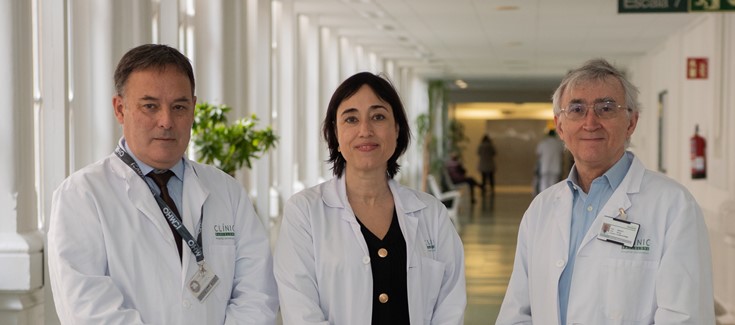
A study led by researchers from the Hospital Clínic-IDIPAPS -in collaboration with CIBERONC-shows that a new treatment without chemotherapy is effective in treating indolent clinical forms of mantle cell lymphoma.With this therapy, most patients were able to discontinue treatment after two years.
The study, published in the Journal of Clinical Oncology, was coordinated by Dr.Eva Giné, haematologist at the Hospital Clínic, member of the IDIBAPS Lymphoid neoplasms research group and researcher at CIBERONC, with the collaboration of the group leader, Dr.Armando López-Guillermo.Dr.Elias Campo, head of the IDIPABS Molecular pathology of lymphoid neoplasms research group and in charge of biological studies also participated in the study, along with Dr.Ramón García-Sanz, head of the Molecular Biology Laboratory of the Hospital Universitario de Salamanca as well as professionals from 12 Spanish centres in the Spanish Group for Lymphomas and Autologous Bone Marrow Transplant (GELTAMO).
Mantle cell lymphoma (MCL) is a cancer of the white blood cells, which represents 2-5% of all lymphomas and has a very paradoxical clinical behaviour.Whilst for most patients this is an aggressive disease, which is hard to treat, a small subgroup of patients have an indolent clinical course, and do not even require treatment.
A different approach for indolent forms of the disease
The treatments that exist today offer very limited results. Intensive immunochemotherapy drugs are usually used, which are nevertheless not curative. In the forms of the disease with a more favourable clinical behaviour, such intensive therapeutic management is probably not required, and a differentiated and personalized approach can be considered.
At a biological level, work carried out over recent years has shown that the most indolent cases can present different biological characteristics to more conventional forms of MCL, and a molecular variant of the disease associated with a better prognosis has been described. Today, however, we still have no clinically applicable biomarkers that can identify these cases properly.“Therefore, it is essential to make efforts to investigate these clinically indolent forms of the disease, to better understand their biology and personalize their treatment”, explains Eva Giné.
First clinical trial in patients with indolent mantle cell lymphoma
The study, published in the Journal of Clinical Oncology is the first clinical trial in patients with indolent clinical forms of MCL.The patients were treated, for the first time, with a free combination of the frontline chemotherapy treatment with the monoclonal antibody rituximab, and an oral BTKinhibitor, ibrutinib (IR).
“In a very innovative way, this study incorporates the use of the determination of the minimal residual disease by molecular methods to decide on and personalize the duration of the treatment in each patient”, points out Eva Giné.An extensive biological study of genetic sequencing was also carried out using Next-Generation Sequencing (NGS) techniques.
The results of the trial show that the combination of ibrutinib and rituximab is very active in the treatment of indolent clinical forms of MCL:there is a high rate of complete responses (over 80% of patients) and undetectable minimal residual disease. This meant that treatment could be stopped after two years in most patients.These results were qualified as provocative by the editor-in-chief of the journal, J.W. Friedberg.
“Whilst awaiting a longer follow-up, in general the patients are maintaining the response and therefore, in the future, this combination could be a very competitive treatment, both due to its efficacy and toxicity compared to more conventional immunochemotherapy-based treatments, at least in this subgroup of patients”, explains Armando López-Guillermo.More studies are needed to establish this, although for the moment the data are very promising.
From a biological point of view, the responses to this treatment are currently comparable in the different molecular variants of MCL.However, patients with TP53 gene mutations are not good candidates for the discontinuation of treatment, as they have an increased risk of disease progression.
Study reference:
Eva Giné; Fátima de la Cruz; Ana Jiménez Ubieto; Javier López Jimenez; Alejandro Martín García-Sancho; M. José Terol; Eva González Barca; María Casanova; Adolfo de la Fuente; Ana Marín-Niebla; Ana Muntañola; Tomás José González-López; Marta Aymerich; Xavier Setoain; Montserrat Cortés-Romera; Amanda Rotger; Sonia Rodríguez; Alejandro Medina Herrera; Ramón García Sanz; Ferran Nadeu; Silvia Beà; Elías Campo; and Armando López-Guillermo, on behalf of the GELTAMO Group
J Clin Oncol 2022 Jan 14; JCO2102321. doi: 10.1200/JCO.21.02321.